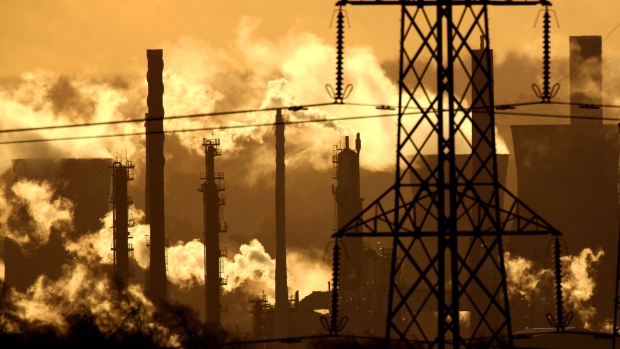Aug 19, 2019
U.K. Oil Refineries Would Face Severe Pressure in No-Deal Brexit
, Bloomberg News

(Bloomberg) -- The U.K.’s oil refineries would be at a severe competitive disadvantage if Britain exits the European Union without a deal and tariffs were imposed on its gasoline exports, according to an industry group.
A leaked government document, on the implications of a no-deal Brexit, claimed that two of the U.K.’s oil refineries could be forced to shut down if tariffs were imposed on British gasoline exports because it would make them noncompetitive compared to facilities within the bloc. However, they are unlikely to face permanent closure, according to industry analysts.
The U.K. Petroleum Industry Association, which represents the country’s downstream oil sector, urged the U.K. government to adopt a policy of reciprocal tariffs so that British exports are on a level playing field with EU refiners. It says that while gasoline imports to the U.K. could benefit from zero tariffs, its exports of the fuel could face a 4.7% charge if the U.K. exits the EU without a deal and defaults to World Trade Organization rules.
“Refining is a margin-tight industry and these tariffs would put a severe amount of pressure on the sector’s competitiveness,” William James, a UKPIA spokesman, said in an interview. British-based refineries will have to make “difficult decisions,” but it’s not clear if that could extend to closure. The leaked government document, known as Operation Yellowhammer, was originally cited by the Sunday Times newspaper.
While U.K. refineries would see their margins squeezed if tariffs are imposed, and possibly even reduce their processing rates, consultant Wood Mackenzie Ltd also said they are unlikely to permanently close.
“There will probably be some degree of run cuts and the profitability of U.K. refiners will fall, but it’s hard to see something as dramatic as closing,” according to Alan Gelder, London-based vice president of refining, chemicals and oil markets at Wood Mackenzie.
Potential Redirection
The U.K. has six oil refineries which combined produce about 400,000 barrels a day of gasoline. About 30% of that -- or 127,000 barrels a day -- is exported, according to Wood Mackenzie estimates.
However, tariffs could cause existing fuel supply routes to be redirected, Wood Mackenzie said. Some of Britain’s current export volumes could be diverted back into the U.K. market, while countries that currently export to the London area, from the Amsterdam-Rotterdam-Antwerp oil shipping hub, could instead send those volumes to the U.S., Gelder said.
As gasoline exports aren’t a primary income stream for every refinery, potential tariffs may not have a significant impact on some plants, according to energy consultant Facts Global Energy.
“Even the one I consider to be most vulnerable in the U.K., Total’s Lindsey refinery in the northeast, most of their gasoline goes into the U.K., so they’re not that bothered about gasoline exports,” said Steve Sawyer, Head of Refining at Facts Global Energy.
A spokeswoman for Total wasn’t immediately able to comment.
Sawyer added that parts of the U.K. which currently import fuel, such as the Thames region, are unlikely to face shortages because supplies can be shipped around the country.
“Refiners could move fuel around the country to re-feed the Thames area, or put it on a boat. The reason they don’t at the moment is because they can get it more easily from Amsterdam, Rotterdam or Antwerp than they can from Scotland,” Sawyer said. “In terms of finding U.K. barrels it won’t be too difficult.”
To contact the reporter on this story: Bill Lehane in London at blehane@bloomberg.net
To contact the editors responsible for this story: Alaric Nightingale at anightingal1@bloomberg.net, Helen Robertson, James Herron
©2019 Bloomberg L.P.


